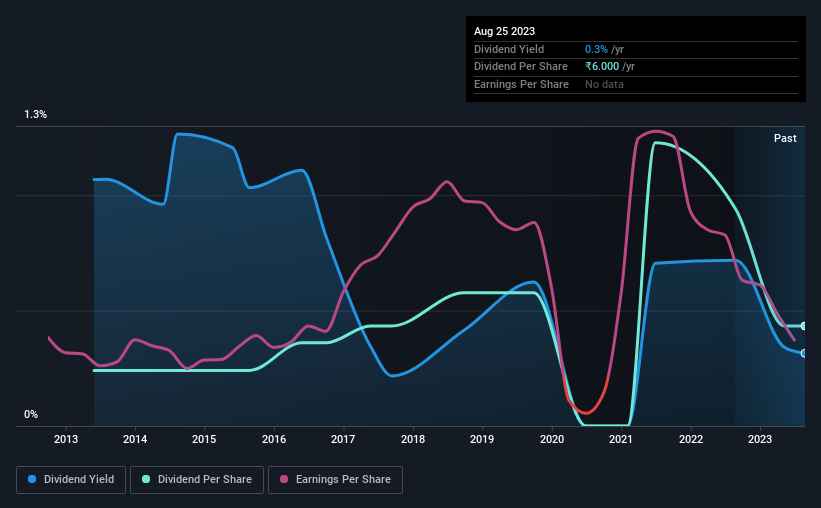Venky's (India) (NSE:VENKEYS) Has Announced That Its Dividend Will Be Reduced To ₹6.00

Venky's (India) Limited (NSE:VENKEYS) is reducing its dividend from last year's comparable payment to ₹6.00 on the 22nd of October. This means that the annual payment is 0.3% of the current stock price, which is lower than what the rest of the industry is paying.
View our latest analysis for Venky's (India)
Venky's (India)'s Payment Has Solid Earnings Coverage
The dividend yield is a little bit low, but sustainability of the payments is also an important part of evaluating an income stock. However, prior to this announcement, Venky's (India)'s dividend was comfortably covered by both cash flow and earnings. As a result, a large proportion of what it earned was being reinvested back into the business.
EPS is set to fall by 28.6% over the next 12 months if recent trends continue. If the dividend continues along recent trends, we estimate the payout ratio could be 33%, which we consider to be quite comfortable, with most of the company's earnings left over to grow the business in the future.

Dividend Volatility
Although the company has a long dividend history, it has been cut at least once in the last 10 years. Since 2013, the annual payment back then was ₹3.33, compared to the most recent full-year payment of ₹6.00. This works out to be a compound annual growth rate (CAGR) of approximately 6.1% a year over that time. It's good to see the dividend growing at a decent rate, but the dividend has been cut at least once in the past. Venky's (India) might have put its house in order since then, but we remain cautious.
Dividend Growth Potential Is Shaky
Growing earnings per share could be a mitigating factor when considering the past fluctuations in the dividend. Venky's (India)'s EPS has fallen by approximately 29% per year during the past five years. This steep decline can indicate that the business is going through a tough time, which could constrain its ability to pay a larger dividend each year in the future.
Our Thoughts On Venky's (India)'s Dividend
In summary, dividends being cut isn't ideal, however it can bring the payment into a more sustainable range. The company is generating plenty of cash, which could maintain the dividend for a while, but the track record hasn't been great. We would be a touch cautious of relying on this stock primarily for the dividend income.
Investors generally tend to favour companies with a consistent, stable dividend policy as opposed to those operating an irregular one. At the same time, there are other factors our readers should be conscious of before pouring capital into a stock. Just as an example, we've come across 2 warning signs for Venky's (India) you should be aware of, and 1 of them can't be ignored. Looking for more high-yielding dividend ideas? Try our collection of strong dividend payers.
New: Manage All Your Stock Portfolios in One Place
We've created the ultimate portfolio companion for stock investors, and it's free.
• Connect an unlimited number of Portfolios and see your total in one currency
• Be alerted to new Warning Signs or Risks via email or mobile
• Track the Fair Value of your stocks
Have feedback on this article? Concerned about the content? Get in touch with us directly. Alternatively, email editorial-team (at) simplywallst.com.
This article by Simply Wall St is general in nature. We provide commentary based on historical data and analyst forecasts only using an unbiased methodology and our articles are not intended to be financial advice. It does not constitute a recommendation to buy or sell any stock, and does not take account of your objectives, or your financial situation. We aim to bring you long-term focused analysis driven by fundamental data. Note that our analysis may not factor in the latest price-sensitive company announcements or qualitative material. Simply Wall St has no position in any stocks mentioned.
About NSEI:VENKEYS
Venky's (India)
Primarily engages in the production and sale of poultry products in India and internationally.
Flawless balance sheet with solid track record and pays a dividend.
Market Insights
Community Narratives



